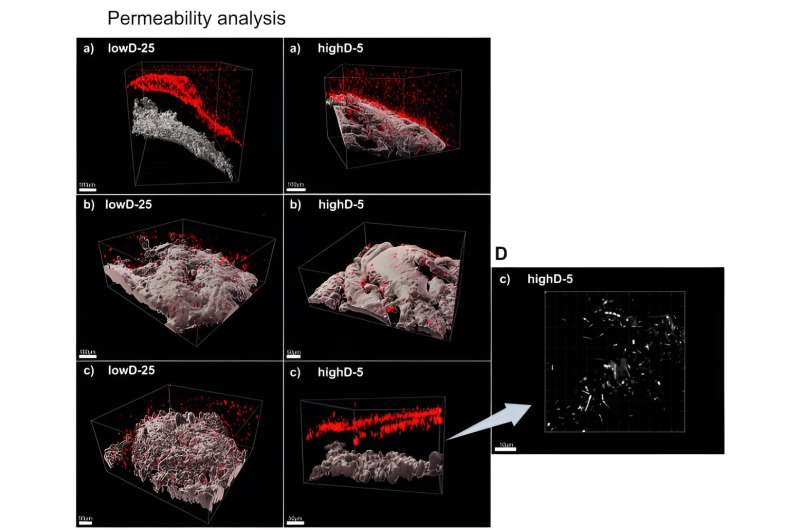This article has been reviewed according to Science X's editorial process and policies. Editors have highlighted the following attributes while ensuring the content's credibility:
fact-checked
peer-reviewed publication
trusted source
proofread
Study highlights long-term, low-grade intestinal inflammation after radiotherapy

Patients who have undergone pelvic radiotherapy may live with low-grade chronic inflammation of the lower intestine 20 years after the treatment. This has been shown in a study by researchers at the University of Gothenburg published in the journal eBioMedicine.
Radiotherapy is often necessary to cure or slow down a cancer. Even though today's radiotherapies feature a high level of precision, healthy tissue in and around the radiation field is still affected. This study highlights a previously unknown side effect of radiotherapy to the lower abdomen.
The mucous membrane of the large intestine is normally protected against contact with bacteria in feces by a thin barrier of mucus. In the current study, researchers at the University of Gothenburg have shown that radiotherapy to the pelvic area affects this thin layer of mucus, allowing bacteria to come into contact with cells on the surface of the intestine. This could be a reason for the low-grade inflammation that the researchers also found in intestines that had been exposed to radiotherapy several years previously.
"It can be hard to detect low-grade inflammation," says Sravani Devarakonda, a researcher at the University of Gothenburg's Sahlgrenska Academy and lead author of the study. "This is the first time researchers have been able to show with certainty that this is happening in cancer survivors, a long time after pelvic radiotherapy has ended. We saw signs of low-grade inflammation as late as twenty years after radiotherapy."
Common intestinal problems
It is common for those who have received radiotherapy for cancer of the cervix, prostate, or rectum, for example, to experience intestinal symptoms many years after completing their treatment. The severity ranges from tenesmus (a feeling of not having emptied the bowels properly despite multiple toilet visits), to very frequent diarrhea (15 times a day or more).
The study is based on samples from 28 people, including 24 cancer survivors. Four of the subjects had not undergone radiotherapy and served as a control group. Among the subjects, the shortest time since radiotherapy was two years and the longest time was twenty years. The median was five years between the end of radiotherapy and intestinal biopsy.
The study was carried out in broad collaboration between clinical and basic science researchers at the University of Gothenburg, Sahlgrenska University Hospital and Karolinska Institutet. Responsible for the research cooperation is Cecilia Bull, an associate professor at the University of Gothenburg's Sahlgrenska Academy.
Long-term changes
"Our study subjects included both patients who had received traditional radiotherapy and those who had the more targeted form, IMRT. We saw low-grade inflammation in both groups. The damage to the surrounding tissue can be limited by IMRT, but there are still long-term inflammatory changes," she says.
The next step for the researchers will involve finding out whether this low-grade inflammation after radiotherapy causes some of the intestinal symptoms often seen in these cancer survivors and, if so, which symptoms are due to the inflammation.
Research is already being carried out to find ways of strengthening the intestines' resistance to radiotherapy, so that long-term symptoms which affect quality of life can be alleviated or even prevented entirely. In an extensive study involving more than 300 patients, researchers are trying to strengthen the protective mucosal barrier by adding extra dietary fiber to the diet before beginning radiotherapy.
More information: Sravani Devarakonda et al, Low-grade intestinal inflammation two decades after pelvic radiotherapy, eBioMedicine (2023). DOI: 10.1016/j.ebiom.2023.104691




















